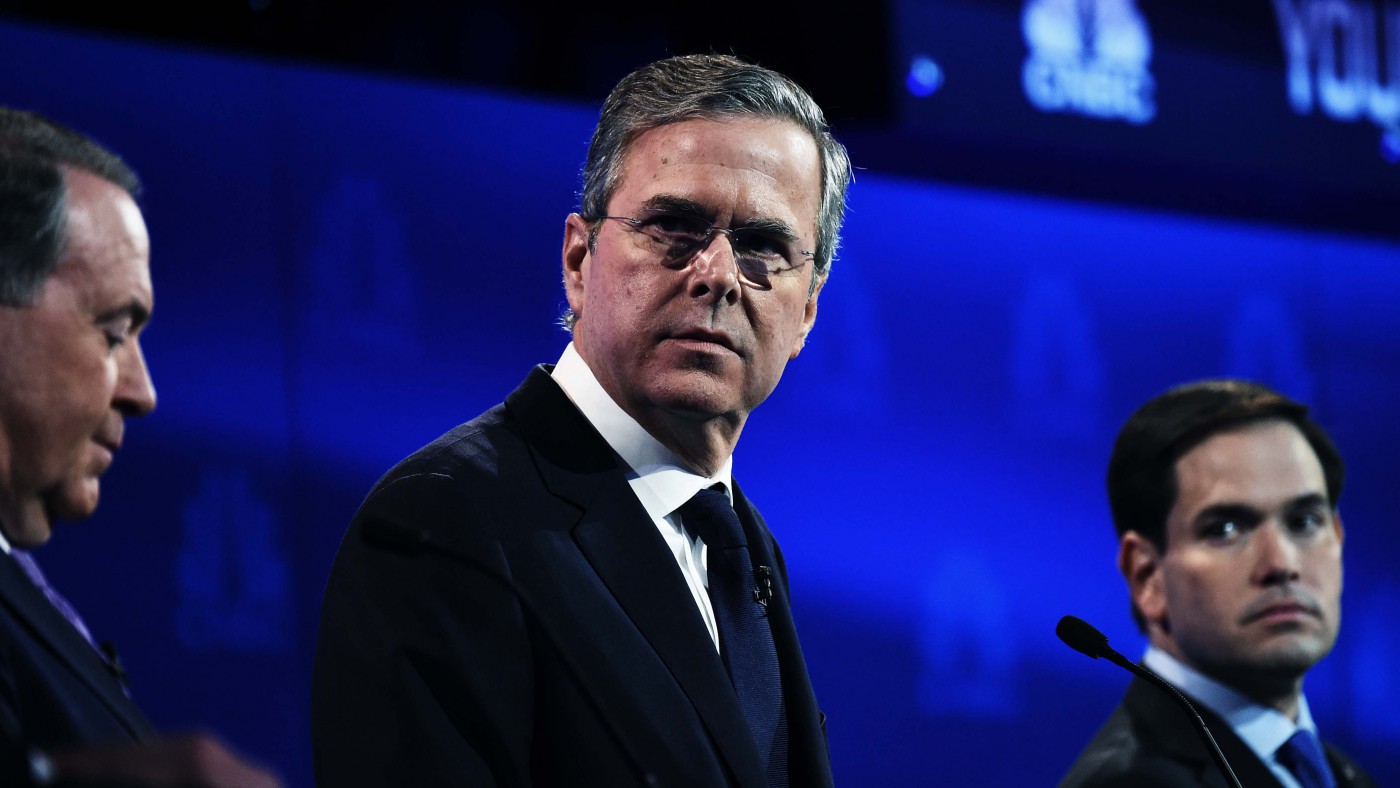Reasonable people might assume that an American presidential candidate who has been governor of a major state, who is a leader in education policy, and who has raised the largest pool of funds would be a favorite for his party’s nomination.That’s a description of former Florida Governor Jeb Bush, son of former President George H.W. Bush and brother of President George W. Bush. (Full disclosure: I worked in the White House for both Presidents Bush.)
But Jeb Bush’s performance in this week’s presidential debate was lackluster. He is polling in the middle of the pack of candidates, behind first-place property developer Donald Trump and second-place neurosurgeon Ben Carson, both politically-inexperienced. He is behind first-term senators Marco Rubio of Florida and Ted Cruz of Texas. This week he cut his staff’s pay and focused on New Hampshire, the first state to vote in the primary. A front runner never retreats to one state.
The meltdown shows the disconnection between the Republican establishment donor class and Republican voters. The donor class wants one candidate, and the voters want another.
Bush has a mind-boggling sway over big establishment Republican donors. He is the epitome of their ideal candidate. He raised $13.4 million in the third quarter, nearly twice as much as Rubio, who raised $5.8 million.
Republican donors like Bush because he is moderate on immigration, favoring allowing undocumented workers without criminal records to pay a fine and remain in the country. He is moderate on social issues, and does not talk about gay marriage or abortion. He talks about the economy, not about the culture wars.
However, moderation and experience is not what voters want, at least not at this point in the 2016 election cycle.
Consider Bush’s supposed qualifications. He was a governor, but Americans now have neither faith nor respect in government. Two other well-regarded governors who were running for president, Governor Rick Perry of Texas and Governor Scott Walker of Wisconsin, left the race because they had minimal support. Governor Chris Christie of New Jersey is close to the bottom of the list, and Ohio Governor John Kasich is not doing much better.
Even on the Democratic side governing is unpopular. Senator Bernie Sanders, an Independent from Vermont, is gaining on former Secretary of State Hillary Clinton and drawing massive crowds not because of his record as a senator, which is unremarkable, but because he is running against the establishment. Experience is no longer a qualification.
Then, consider Bush’s record in improving Florida’s education system. Bush raised standards in Florida and supports the Common Core, a set of educational standards that President Obama is trying to require for schools throughout the country. Now, each state is free to set its own standards. But education is not at the forefront of what animates voters these days, and certainly not Common Core. They want to get the government off their backs; they don’t want more or better government.
Donors love Bush because he represents the status quo, the safe choice. In contrast, voters want someone who will rock the boat, not someone who is safe. That is why the front runner is Donald Trump, who goes around saying that he will prevent illegal immigration, get Mexico to build a wall to stop people entering the United States, and get China to back down (whatever that means). Ben Carson, number 2 in many polls, is another unorthodox choice.
Bush’s support is declining among voters for other reasons. Voters want someone with charisma, and he lacks charisma. His last name is Bush, and voters don’t have good memories of the past two Presidents Bush. He last ran for election in 2002, and he’s a little out of practice.
He came to Wednesday night’s debate with substantial hope because of his declining standing in the polls. Donors were wined and dined in Houston this week with Presidents George H.W. and George W. Bush and told that Jeb was the winning candidate.
The onus in the debate was on Bush to prove himself as leader of the group of Republican candidates who had won elected office. But he failed dramatically. He attacked Rubio, accusing him of missing votes and being absent from the Senate. Rubio was fully prepared and his response made Bush look weak. He never recovered.
The candidates who have the most voter support now are those running against the establishment. After Trump, Carson, and former HP CEO Carly Fiorina, the most popular politicians are Rubio and Cruz, who depict themselves as anti-Washington candidates. If the non-politicians fall by the wayside, as they often do, look to these two young candidates to take the lead.
Donors and strategists are singing the praises of experience and stature. But voters want a Republican nominee who will shake things up and address issues that are most important to American voters. That’s why the allegedly “ideal candidate” is struggling.


